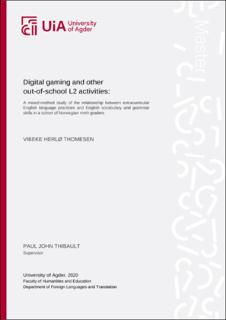| dc.contributor.author | Thomesen, Vibeke Herlø | |
| dc.date.accessioned | 2020-10-01T13:20:09Z | |
| dc.date.available | 2020-10-01T13:20:09Z | |
| dc.date.issued | 2020 | |
| dc.identifier.citation | Thomesen, V.H. (2020). Digital gaming and other out-of-school L2 activities: A mixed-method study of the relationship between extracurricular English language practices and English vocabulary and grammar skills in a cohort of Norwegian ninth graders (Master´s thesis) University of Agder, Kristiansand | en_US |
| dc.identifier.uri | https://hdl.handle.net/11250/2680744 | |
| dc.description | Master´s thesis in English (EN500) | en_US |
| dc.description.abstract | The present mixed-method study investigated the influence of digital gaming and other extracurricular English (EE) language practices on the English vocabulary and grammar skills of a group of Norwegian ninth graders. The participants (n = 16, ten girls and six boys) were aged 14–15. Quantitative data were gathered through language diaries, a productive vocabulary test,and a grammaticality judgment test, whereas qualitative data were collected through semi-structured interviews with seven of the participants. Previous research has found out-of-school English language practices, and digital gaming in particular, to positively correlate with English proficiency in young learners of English as a second language (Sundqvist, 2009; Sylvén and Sundqvist, 2012).The present study distinguished between ‘online’ (requiring communication with peers) and ‘offline’ (no communication with peers) gaming in the language diaries, with the aim of discovering potential differences in impact on the ninth graders’ English proficiency. Findings revealed statistically significant (p < 0.05) correlations between online gaming and productive vocabulary skills, and between total time spent on EE activities and productive vocabulary skills. Additionally, the language diary data revealed unexpected differences between the EE habits of male and female participants, with none of the girls spending any time on online gaming .Furthermore, the male participants attained higher vocabulary scores than the female participants. The difference between scores was however only marginally significant (p < 0.1).The qualitative data enabled triangulation of findings and interpretation of the quantitative findings in context. | en_US |
| dc.language.iso | eng | en_US |
| dc.publisher | University of Agder | en_US |
| dc.rights | Attribution-NonCommercial-NoDerivatives 4.0 Internasjonal | * |
| dc.rights.uri | http://creativecommons.org/licenses/by-nc-nd/4.0/deed.no | * |
| dc.subject | EN500 | en_US |
| dc.title | Digital gaming and other out-of-school L2 activities:A mixed-method study of the relationship between extracurricular English language practices and English vocabulary and grammar skills in a cohort of Norwegian ninth graders | en_US |
| dc.type | Master thesis | en_US |
| dc.rights.holder | © 2020 Vibeke Herlø Thomesen | en_US |
| dc.subject.nsi | VDP::Humaniora: 000::Språkvitenskapelige fag: 010::Engelsk språk: 020 | en_US |
| dc.source.pagenumber | 121 | en_US |

